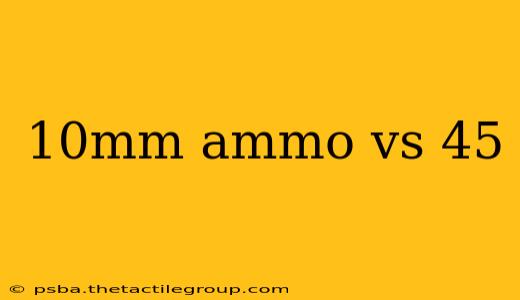Choosing the right caliber for self-defense or recreational shooting is a crucial decision, and the debate between 10mm Auto and .45 ACP often arises. Both are powerful cartridges with dedicated followings, but they offer distinct advantages and disadvantages. This in-depth comparison will help you understand the nuances of each caliber and determine which might be the better fit for your needs.
Ballistics: Power and Penetration
Let's dive into the raw power and penetration capabilities of these two cartridges. While specific performance varies based on bullet weight, type, and manufacturer, we can establish some general comparisons:
10mm Auto:
- Higher Velocity: Generally boasts higher muzzle velocity than .45 ACP, translating to flatter trajectories at longer ranges. This means better accuracy at distance.
- More Versatile: A wider range of bullet weights and designs are available, offering more options for specific applications like hunting or self-defense. You can find rounds optimized for penetration or expansion.
- Potentially Higher Energy: Depending on the load, 10mm can deliver more kinetic energy than .45 ACP, leading to greater stopping power.
.45 ACP:
- Larger Diameter: The significantly larger diameter bullet (.452 inches vs .400 inches) creates a larger wound cavity upon impact. This is often cited as a factor in stopping power.
- Substantial Stopping Power: Known for its reputation as a powerful, effective self-defense round. The massive bullet diameter contributes to significant tissue damage.
- Lower Recoil (Generally): While both calibers have substantial recoil, .45 ACP often exhibits slightly less recoil, especially with heavier bullets, making it potentially more manageable for some shooters.
Recoil and Shootability
Recoil management is a critical consideration for any handgun cartridge. Both 10mm and .45 ACP deliver substantial recoil, but the experience can differ:
- 10mm: The higher velocity of the 10mm often translates to a sharper, snappier recoil. This can make rapid follow-up shots more challenging for some shooters, particularly those with less experience.
- .45 ACP: While still powerful, the .45 ACP generally delivers a more manageable recoil impulse due to its lower velocity and heavier bullet. This can lead to better accuracy during rapid fire for many shooters.
Capacity and Concealed Carry
Magazine capacity and overall firearm size play a significant role in choosing a caliber for concealed carry:
- 10mm: While some 10mm handguns have higher capacity magazines than their .45 ACP counterparts, the overall size of 10mm firearms tends to be larger and potentially heavier. This may impact concealed carry comfort and convenience.
- .45 ACP: .45 ACP handguns are widely available in various sizes, including compact and subcompact models, making them suitable for concealed carry. However, the magazine capacity is often lower than 10mm.
Ammunition Availability and Cost
Ammunition availability and cost are practical considerations for any shooter:
- .45 ACP: .45 ACP ammunition is generally more widely available and often less expensive than 10mm ammunition.
- 10mm: 10mm ammunition, while readily available from major manufacturers, may be slightly more expensive and might have less variety in some regions.
Conclusion: Which Caliber is Right for You?
The "better" caliber – 10mm or .45 ACP – depends entirely on your individual needs and priorities. There's no single right answer.
-
Choose 10mm if: You prioritize higher velocity, flatter trajectory, greater versatility in ammunition selection, and potentially higher energy. Be prepared for snappier recoil.
-
Choose .45 ACP if: You value a larger diameter bullet, manageable recoil, easier availability of ammunition at a lower cost, and a wider variety of compact firearm options for concealed carry.
Ultimately, the best way to make an informed decision is to rent or borrow firearms chambered in both calibers and test them at a shooting range. Experience firsthand the recoil, accuracy, and overall shooting experience before investing in a firearm and ammunition. Consult with experienced shooters and firearms instructors to gather additional insights based on your specific circumstances and skill level.

